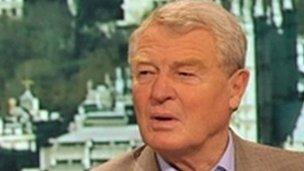Lib Dem conference: Ashdown attacks lack of internationalism
- Published

Lord Ashdown criticised the "blindness" of Europe's leaders towards changes taking place in the world
Former Liberal Democrat leader Lord Ashdown has accused his party of "abandoning our internationalism" since coming to government.
He said it had become "too deeply immersed" in domestic politics, losing some of its "distinctiveness".
The comments come after the Lib Dems lost their only Foreign Office minister in the recent reshuffle.
There has also been no main debate on foreign policy during the party's annual conference in Brighton.
In a speech to a fringe meeting organised by the Centre Forum think tank, Lord Ashdown said: "There is now almost no area of domestic policy which does not have an international element.
"So why has Britain's only truly internationalist party, at a time when we need more distinctiveness, abandoned our internationalism?
"I know the answer, of course: because we are so deeply immersed in the domestic challenges of government, that we have forgotten the importance of foreign policy.
"That's a reason. But it's not an excuse."
'Leading role'
In the recent government reshuffle Lib Dem MP Jeremy Browne moved from the Foreign Office to the Home Office, meaning the party lost its representation within the department.
The Lib Dems and Conservatives have profound disagreements over the issue of Europe, with the former generally more in favour of closer integration than the latter.
The coalition agreement states that the UK should play a "a leading role in an enlarged European Union, but that no further powers should be transferred to Brussels without a referendum".
On foreign affairs more generally, it adds that it "must always be an active member of the global community, promoting our national interests while standing up for the values of freedom, fairness and responsibility".
This includes being a "constructive member of the United Nations, NATO and other multilateral organisations including the Commonwealth; working to promote stability and security; and pushing for reform of global institutions to ensure that they reflect the modern world".
But Lord Ashdown argued that not enough was happening to promote a genuinely internationalist agenda within government, saying: "Today there is no major challenge which confronts us which can be solved by a nation state acting alone."
He cited crime, the environment, the economy and skills training among the areas affected.
'Excesses'
Lord Ashdown added: "Huge amounts of the power which used to be locked within the nation state, subject to it its laws, controlled by its systems and held to account by its democracies, has now migrated to the global stage where, by and large, the rule of law is at best weak, the systems of control inadequate and the mechanisms for accountability non-existent.
"The uncontrolled power of the international money changers and speculators, whose excesses have brought us to the very edge of financial ruin.
"The power of global media organisations who, cavalier about both our laws and our standards, can make politicians grovel and corrupt the whole democratic process. The power of the multi-nationals, many with budgets bigger than medium-sized states.
"The power of the internet operators, of the international market place, of the satellite broadcasters - all of them free to operate largely without either legal constraint or moral code.
"This international lawless space suits the powerful for a bit. For a bit, lawless spaces always do.
"But sooner or later lawless spaces get occupied by the lawless. And so amongst those things we like which operate in the global space, like the internet and global information exchange and global mass travel, we now also have the things we don't like, such as global crime, global trafficking and global terrorism."
Lord Ashdown said there should be a greater role in future for the World Trade Organisation, the World Bank, the International Monetary Fund and the International Criminal Court.
He added: "There are plenty of things that make me frightened in our present world. But one of the things that makes me most frightened is the blindness of Europe.
"The complete failure to understand just how much the world has changed these last 10 years."
Lord Ashdown was Lib Dem leader from 1988 to 1999 and the international High Representative for Bosnia and Herzegovina from 2002 to 2006.